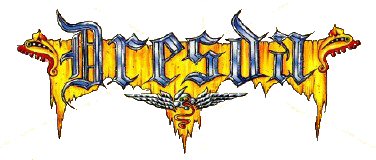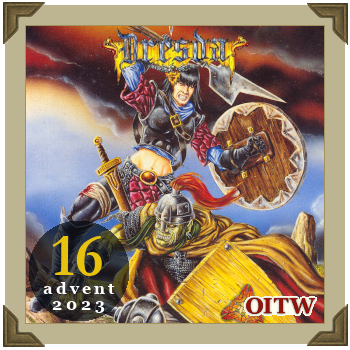 'A Fistful of Groats'
'A Fistful of Groats'
An Introduction to Dresda by Steve Blease

Art by Pete Knifton
An introduction to the original, and now somewhat apocryphal, pre-Flintloque game of Dresda.
~
Editor's Note
This article was written in 1996 by on of the co-creators of Flintloque and Dresda, Steve Blease.
~
Into the Arena
When Alternative Armies decided to release Dresda into the increasingly crowded high fantasy wargaming market, no doubt many of you were baffled, especially as there seemed (and is - and will be!) so much left to explore in the era of Flintloque. What with Warhammer Fantasy Battle, Leviathan and Raven having been released (or re-released) within the last twelve months or so with mixed results, one might even question the sanity behind it!
That said it is important to bear in mind that Dresda is different from all the aforementioned products in one major area. Yes, it contained all the standard (one might even say cliched, though we've tried to add subtle slants to most) races, in a fairly standard high fantasy world. However rather than provide you with another set of mass battle rules, for which you need hundreds of figures, we looked carefully at how successful Flintloque had proved (a damn sight more than ever envisaged) and why.
Okay, the background to Flintloque was unique and this is a major attraction to gamers, but not to the extent that that if we had released a mass battle black powder system, requiring hundreds of figures for your armies would you have been as attracted - probably not, and off floats another excellent original idea down the sewer of gaming failures (though now the Idea of a black powder fantasy is established through Flintloque garners will now hopefully be more receptive to such a product when it does finally come out). The main reason Flintloque has been so successful was because it was a skirmish game that you could play immediately with just the sixteen figures you got in the box and a simple set of rules that worked.
So Mac got his thinking cap on, looked at bog standard high fantasy (and no doubt a lot of existing fantasy figure moulds in the AA factory!) and said: "Ere, why don't we do Flintloque without guns?" (or something to that effect), which eventually led to the production of Dresda.
As with Flintloque you only have a few figures per side and rather than spend hundreds (thousands) of pounds, dollars, deutschmarks or whatever buying all that white metal for one army, you could raise lots of different types of units from loads of different races. So, if like me, you have a massive half completed Orc and Goblin army, that you cannot raise any enthusiasm for to finish painting and have now seen some excellent Dwarves that inspire you to get your paintbrush on, you've now got an excuse! With small units of up to just twenty figures, you can now buy Dwarves, Goblins, Elves and Orcs AND have a game to use them in...
A Question of Approach
The game itself differs considerably from your typical fantasy wargame and on some levels leans more towards the role-playing genre rather than traditional wargaming, which leads to a whole new approach being demanded when it comes to getting your figures on the tabletop and playing the game.
With most fantasy wargames, you can draw upon historical battles to come up with good ideas for scenarios (assuming you're not just lining up on opposite sides of the table and charging towards the middle - yuk!), but whilst no doubt it happened, the chronicling of small unit combat during the pre-gunpowder periods isn't exactly what you would call over chronicled. Even Flintloque isn't a great deal of help, yes, some scenarios can be translated into Dresda ones, but they only provide one aspect of the game. It should be remembered that Flintloque, by and large, works with the premise of units being part of standing armies doing the usual military stuff they're ordered to do. In Dresda it is more likely that you unit will be the exact opposite and is very unlikely to be part of a standing force getting regular wages. Anyway, if all you are going to do with Dresda is convert your Flintloque battles into ones with bows and swords, then what was the point in buying it?
Dresda is a lot more than Flintloque without guns and it is important that it is not approached as such. To obtain the most enjoyment with Dresda you need to adopt an imaginative approach to scenario creation, taking inspiration from many sources, no matter how far removed they may actually be to the world of Valon.
Go West Young Man
Personally I tend to regard Dresda as more of a Wild West game in approach than a pseudo-medieval one. Odd though this may sound it's true. Take the first two scenarios in Dresda; Blood of My Enemies and Blood of Heroes, both are based on the film The Magnificent Seven (and the film's inspiration The Seven Samurai). The Wild West, whether you take the truth or the Hollywood version is crammed full of ideas for Dresda games. The waggon train across the plains being attacked by Injuns? How about Middlelands pilgrims hiring your fighters to protect them from Orc bandits? Settlers driving off rustlers? Bank raids? Posse's? Get the drift? The West was a frontiersland - so are the Middle Kingdoms treat them as such. In fact any frontier can serve to inspire. What about the Khyber Pass and the Great Game? Films and book abound about many "last frontiers" - use them.
Bodice Rippers and Noble Quests
Legends such as that of Arthur and the Knights of the Round Table are obvious areas to pillage for ideas, but don't get stuck in the chain and sword period for your scenarios. Many of the 17th, 18th & 19th Century bodice rippers translate brilliantly, you only have to look at The Three Musketeers to get your blood stirring. Turn Richleau into a scheming Dresdan Priest determined to gain power at Otto III's behest and you're away. Period drama is popular on TV and often can spark the most jaded brain - hell, you want to see the ideas that Muppet Treasure Island got me thinking about!!
Quests need not just to be about treasure, they can be about rescuing virgin princesses or as Matthew Hartley has shown us this issue, saving terrorised villagers from fell beasties. The solo gamer can have endless fun here inspired by epic tales such as Beowulf.
The Night Belongs to Charlie
Vietnam may seem an odd source of inspiration but is also one to draw on. I was led to this train of though by Simon Evans who likened the campaigns of Alfred the Great around Glastonbury in Dark Ages Britain to the fighting in Vietnam, with the Vikings launching punitive raids against the illusive Saxons, who regularly ambushed their enemies in a low intensity war in inhospitable marshy terrain. Guerrilla warfare from both sides can lead to a fascinating series of battles with mercenaries and other fighters being hired both either side for a set number of battles the GM perhaps rewarding successful actions with some form of win bonus (maybe like the "head-geld" in Dresda's scenarios?)
The whole sphere of terrorism and counterinsurgency warfare may seem an odd one for. a fantasy game, but having read an article on COIN Ops in Ragnarok 27, a GM could have great fun pitting players up against terrorists that melt into the background of an innocent civilian population they are instructed to protect. Success or failure can be judged by the ability of the players to not kill innocent civilians whilst still getting the bad guys. A different game certainly, but challenging...
It's a Fair Cop Guv
As suggested when looking at Westerns. bank raids can form many interesting games, but this is just the tip of the iceberg for those interested in a life of crime (or crime enforcement). Take Simon Evans' Outlaw Blues Flintloque scenario, a perfect example of a bandit sweep that would work just as well for Dresda.
But don't just restrict yourself to bank raids and bandit sweep, hijacking, kidnapping, smuggling and bootlegging (check out the film and TV series The Untouchables) all lend themselves to re-interpretation for games of Dresda.
In fact leading on from Al Capone and The Untouchables you can even delve into the depths of Mob Warfare between different crime gangs, maybe your fighters have been hired by one side or the other has hired you to perpetrate a Dresdan St Valentines Day Massacre.
The Tip of the Iceberg
Of course all this is just scratching the surface, though hopefully these thoughts will have sparked a few brain cells and got you thinking about more than just standard military scenarios when it comes to playing Dresda. As I said it is just a question of approach and I've no doubt that you too can come up with lots of exciting games, I look forward to seeing some in future Orcs in the Hills. Dresda is one of the most flexible fantasy wargames available - but the flexibility comes more from players exercising their imaginations than anything else.
~
What is Dresda?
Dresda was the original sister game to the first edition of Flintloque, released way back in 1996. It used the fantasy range of miniatures available from Alternative Armies and brought with it an excellent and dynamic campaign system. It also shared the same central mechanics as its older sibling. This meant we we could run games that pitted fantasy armies against Blackpowder armed Orc redcoats and see the new order on Valon storm the castles of the old.
The game saw players managing bands of mercenaries, trailing the countryside looking for work and running up against other units with the same idea. Like Flintloque, scenario driven battles were a key element in its design, coupled with the roleplaying aspect of running your unit including equipping them with things found on the battlefield and paying them from a limited supply of Groats. It was more involved and offered a richer campaign framework than most wargames from that time. A few years later Games Workshop's Mordheim came out and the world was wowed by its innovative use of warbands and campaign tracking which Alternative Armies had actually been doing for few years already.
Dresda sadly went out-of-print never to be re-released and years later Alternative Armies went in a different direction releasing Darkstorme, offering a slightly different take on the pre-Blackpowder history of Valon using an original D6 based system.
~
Webmaster's Notes
'A Fistful of Groats' was originally published in the fifth issue of Wessex Games' Orcs in the Hills magazine. It was first added to Orcs in the Webbe on the 23rd December 2007.
However, it was absent for many years due to a prior regeneration of the website not transferring everything over correctly. This wrong has now been righted and it returned as the sixteenth entry in 2023's Advent Calendar and is, of course, part of Orcs in the Webbe's ongoing Flintloque Archive Project.
Any comments in maroon in the article above have been added by me either to provide additional information or clarity. I may also have made small changes to grammar and layout but have not marked these.
* Loosely based on words I wrote when I released Dresda digitally on v4 of Orcs in the Webbe back in 2008.
